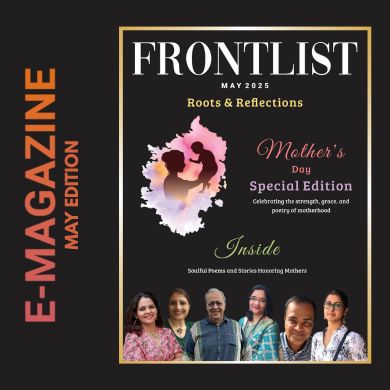Interview with Swapna Dutta, Author of “Tinku's Summer Adventure & Teddy: The Naughty Dog”
Interview with Swapna Dutta on her books "Tinku's Summer Adventure" and "Teddy: The Naughty Dog," discussing cultural diversity, pets, and the evolution of children's literature.on Jul 18, 2024
_(1).jpg)
Swapna Dutta is a leading author of books for young readers, with close to fifty works and translations to her credit. In the four decades of her writing career, she has contributed to leading dailies, magazines and journals, and presented several papers on children’s writing at leading forums across the world.
She has been awarded for her exemplary work, receiving academic accolades and fellowships in countries like Japan, Germany, Austria and several others.
Frontlist: "Tinku's Summer Adventure" explores life in a small village in Bengal. How important is it for children to read about diverse cultural settings, and what message do you hope to convey through Tinku's experiences in Palashdanga?
Swapna: India is a country that is comprised of many different states, languages, and cultures. When I wrote "Tinku's Summer Adventure" I definitely felt that it is good for children to be aware of some of the interesting differences in the local culture, landscape, food and social practices in states other than their own.
But more importantly, I wanted to emphasize the fact that these differences are more or less superficial and human nature and reactions are the same everywhere. So what takes place in one state – a bull straying into a well-made garden and destroying it completely, a sneak thief trying to sell off his stolen goods before getting caught or a foolish servant taking things literally and bringing home a cartload of unwanted vegetables- could take place anywhere and the readers anywhere would find them amusing.
I also wanted the children of today to know something about the not-too-distant past. Not the epic past or the historical past but about the way their parent's generation had lived and acted. I felt it would make them understand the kind of upbringing they had and why they feel differently about many things.
Frontlist: "Teddy: The Naughty Dog" introduces readers to a lovable Alsatian and his antics. Pets often play significant roles in children's lives. How do you believe Teddy's character can teach young readers about responsibility, empathy, and the joy of companionship?
Swapna: Having grown up in a house with two lively Alsatians who belonged to my grandfather, I have been familiar with their ways, their antics, and their moods and have known firsthand what wonderful and dear companions they make even when they add to one's responsibility. Quite often, one needs to sacrifice part of one's leisure time to take them for walks or to stay back from some interesting function if they are not well because one doesn't have the heart to leave them alone. In fact, pets are part of the family. Growing up with a pet is a rich experience that I feel every child should share, although the pets may differ according to taste and convenience
Frontlist: You have contributed to children's magazines like "Chandamama" and "Tinkle." How do short stories for magazines differ from writing full-length books, and what do you enjoy most about each format?
Swapna: And also Children's World and Target. Children's World, started by Shankar, founder of Children's Book Trust, in 1968 was the first all India children's magazine in English and that was where I started my career as a writer. Target (part of The Living Media) came some years later and was very popular too.
Writing for a magazine is very different from writing a full-length book and, in some ways, far more difficult and challenging. To start with, there is a rigid restriction on words. The characters have to be introduced; the story has to develop and reach the climax within those limited words. In Children's Words, the upper limit was 1,200 words, and in Target, 1,800. Chandamama stories had to be within 1000 words. In Tinkle, the story had to be told in the comic format. Stories published in newspapers allowed even fewer words (for example, Telekids allowed 800 words, but The Young World only 500). But I always enjoyed this challenge.
In a full length book the writer is free to develop the characters and situations without being restricted by word limit. It is especially enjoyable because the writer stays much longer with a book and can describe characters, settings and incidents the way he/she likes. I think I have enjoyed both experiences equally.
Frontlist: As an author who has seen the evolution of children's literature over decades, what changes have you observed, and how do you adapt your writing to these changes?
Swapna: Children's books have come a long way since I wrote my first book way back in the mid 70s. Today a children's book can have practically anything for a subject and it can be written in any style and format. I have great admiration and regard for the writers and editors of today for being able to shake off multiple shibboleths that bound us and forced us to be traditional and never dare to go off the beaten track if we cared to be published at all.
During my first few decades as a writer, editors and publishers followed very rigid rules. All stories had to have a beginning, a middle and an end. Every "t" had to be crossed, and every "i" dotted. Every story had to have some moral, either directly or indirectly expressed. No children's story was allowed to have anything violent or unpleasant. The list was endless. We writers often felt rebellious and wanted to try new things, but no publisher would accept it. Even my writing of Juneli (a school story) was considered a wild experiment in the mid-1970s. Although the editor agreed to publish the first 3 chapters of the book, he told me frankly that he would stop the series if it did not work and I should be prepared for it. But children loved it from the word go, and there were so many letters to the editor that I was not only allowed to complete the story but also write two more sequels, which were also serialized in Children's World before being published as books.
Gradually, editors started accepting realistic themes such as children from broken homes and children who fight against poverty, communalism and corruption. With time, my stories got more contemporary, dealing with children of today and the kind of problems they face now. But frankly, my stories about today's children and current themes are very few because I feel I don't know them closely enough to identify with them.
Frontlist: What role do you believe extracurricular activities, like reading for pleasure, play in a child's overall educational experience? How can parents and educators encourage this?
Swapna: Reading for pleasure is very important, not only for a child's mental development but once he/she learns to enjoy reading he/she acquires a lifelong hobby to indulge in and never feel lonely or bored. But this love of books should come spontaneously and not be forced on the child as a part of school work.
Educators (librarians, teachers) can certainly encourage this if they go about it the right way and make it an interesting experience for children. They can ask the children to read a popular book and then discuss it with them - talk about the characters, incidents in the story and ask each child why he or she liked it or did not like it. Or organize a quiz on popular books. That would make the books come alive for the children and encourage them to read more.
Similarly, if the parents wish their children to read, it is not enough just to buy them books. They (especially the mothers) should also make time for reading themselves and devote some time discussing books with them. If they spend all their time on TV and their mobiles and simply tell the children to read books it is not likely to have much impact on them.
Frontlist: How do you envision the long-term impact of your books on children's perspectives and aspirations, especially as they grow older and face their own challenges?
Swapna: I don't know how much impact my books have had on children or if they have helped them face any challenges in life. But I do know that many of the leading writers of today (Madhulika Liddle, Swapna Liddle, Devika Rangachari, Nandini Nayar, Santhini Govindan, and Roopa Pai, to name only a few) who grew up reading my books, have told me or written to me to say that I have been their role model or inspired/encouraged them to become writers.
I constantly come across people from different walks of life- (teachers, doctors, lecturers, government officials, a police officer and even my lawyer) who tell me that they remember my stories which they had read during their schooldays. I feel so amazed and touched that they still remember me and consider it to be the best reward any writer can ask for. I don't know if shops stock my books or how much they sell, or whether they are visible anywhere. I am happy to have a place in the hearts of my readers.
Frontlist: Finally, what projects are you currently working on, and what can readers expect from you in the near future? Are there any new adventures or themes you are excited to explore?
Swapna: I think I have said enough during my long innings, and I have not written anything new for a long time. If I am still on the road, it is because once there, no writer can get away. But I am no longer a part of the race.
During the last few years, I have been busy collecting my old writings that have appeared in various magazines, newspapers, and websites, both here and abroad. I have made a collection of my best-loved stories for younger children (Stories for a Summer Noon), a collection of stories for young adults (That Stormy Evening and Other Stories), a collection of stories from classics and epics (The Rejected Princess and other stories); a collection of stories from Indian history (The King who Lacked Learning); a collection of festival stories (It's Festival Time); a collection of travelogues (To Sail Beyond the Sunset) and a collection of true incidents (A Little Love, A Little Laughter). These 7 books were published by Ukiyoto, a Canada-based publisher. It was not exactly self-publishing because Ukiyoto does not charge the author anything for the books that their editorial team selects for publishing.
Even now a lot of my writing remains scattered. If I can find the energy, I might make a few more collections!



.jpg)






.jpg)


.jpg)
.jpg)
.jpg)
.jpg)
.jpg)










Sorry! No comment found for this post.